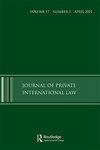Resulting trusts in the conflict of laws: an Australian perspective
IF 0.5
Q3 LAW
引用次数: 0
Abstract
The common law world continues to grapple with how to properly characterise equitable doctrines in private international law. There has been extensive criticism of the existing approach to characterisation and choice of law for equity which favours separately characterising equitable obligations and applying the lex fori. Within this broader discourse, a debate is beginning to emerge around issues involving both equitable obligations and immovable property. In this early debate, two schools of thought have developed with respect to the proper characterisation and choice of law for implied or resulting trusts over immovable property. The first approach, advanced primarily by the courts, characterises the trust as an equitable obligation governed by the lex fori. The second approach, primarily endorsed by commentators, characterises the trust as an issue of immovable property governed by the lex situs. This paper, upon evaluating the lex fori and the lex situs against the underlying objectives of choice of law, rejects both approaches as unfit for purpose. Instead, it advocates a new approach to the characterisation and choice of law for resulting trusts. This paper proposes that resulting trusts be governed by the proper law of the relationship. This conception would align with the approach taken to express trusts under the Hague Trusts Convention and most effectively provides for consistency and clarity while upholding the reasonable expectations of the parties.法律冲突中产生的信任:澳大利亚视角
普通法世界仍在努力解决如何在国际私法中恰当地描述公平原则的问题。对衡平法的现有定性和选择方法提出了广泛的批评,这种方法倾向于分别定性衡平法义务和适用法院法。在这一更广泛的讨论中,围绕涉及公平义务和不动产的问题开始出现辩论。在这场早期的辩论中,关于不动产默示信托或归复信托的法律的适当定性和选择,出现了两个学派。第一种方法主要由法院提出,将信托定性为受法院法管辖的衡平法义务。第二种方法主要得到评论家的赞同,将信托定性为受所在地法管辖的不动产问题。本文根据法律选择的根本目标来评估法院地法和所在地法,认为这两种方法都不符合目的。相反,它提倡一种新的方法来描述和选择归复信托的法律。本文提出,归复信托应遵循适当的关系法。这一概念将与《海牙信托公约》规定的表示信托的方法相一致,最有效地提供了一致性和明确性,同时维护了各方的合理期望。
本文章由计算机程序翻译,如有差异,请以英文原文为准。
求助全文
约1分钟内获得全文
求助全文

 求助内容:
求助内容: 应助结果提醒方式:
应助结果提醒方式:


